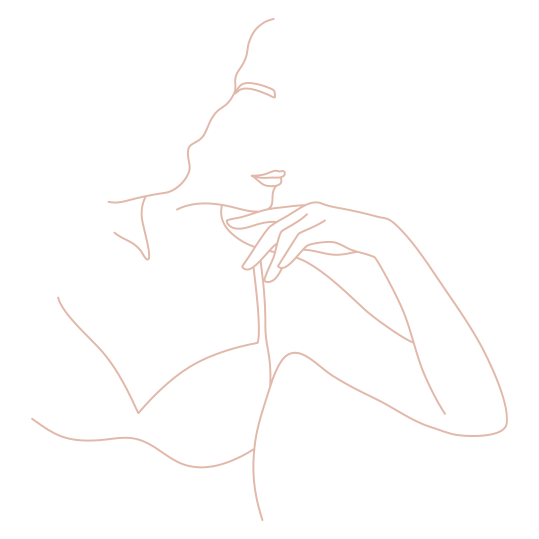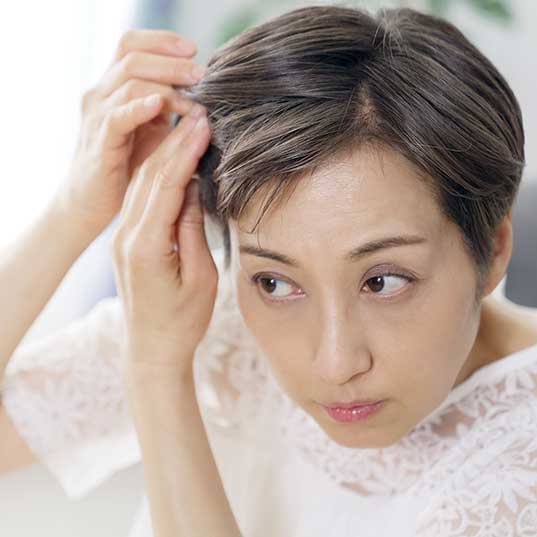Take our hormone questionnaire
If you’re experiencing any symptoms, complete our short quiz.
Or get in touch now!
Head straight to our contact page and complete our form there. Our team will be in touch right away.
Your hair makes you feel and look beautiful. But what can you do if you start to lose your hair? Those hairs in your shower drain can be frightening to notice, and loss of hair can be a true blow to a woman’s self-esteem.
The symptoms of perimenopause and menopause are a bit different for each woman. For many women, hair loss is a symptom that strikes close to home. While there are other causes for hair loss, the hormonal imbalance that begins at perimenopause is at the heart of most women’s thinning hair in midlife. Take a look at why hair loss occurs and what you can do about it.

About 50% of women experience hair loss as they age, and by age 60, that number goes up to 80%. So you’re not alone if you’re dealing with thinning hair. For most women, hair loss isn’t the extreme, dramatic event that men experience. Instead, women tend to see their hair thin out all over their head rather than developing obvious bald spots. They may also experience hair falling out in clumps while they’re showering or brushing their hair.
Hair loss during your 40s and 50s is almost always the result of the hormonal imbalance that occurs at menopause, when your body decreases its production of estrogen and progesterone. These hormones are crucial to the healthy growth and maintenance of hair. As their levels in your body declines, your hair slows its growth and becomes thinner.
In addition, the decrease in estrogen production results in an increase in the production of androgens, which are male hormones. These hormones shrink your hair follicles, so you end up with less hair on your head. Individual hairs also become finer, making your hair appear thinner as well. They can also cause hair to grow on your face.
The primary cause of hair loss in women is loss of estrogen and progesterone, the hormones that help hair grow and keep it healthy. For women in their 40s and 50s, hair loss can just about always be traced to the hormonal imbalance caused by menopause.
Your hair loss is almost certainly not related to any other medical problem. While your doctor may test for some other medical causes, including anemia, thyroid issues, various skin disorders and autoimmune diseases, or elevated levels of testosterone (which is also a type of hormonal imbalance), the greatest likelihood is that menopause’s decline in estrogen levels is to blame.
Other factors can play a contributing role in hair loss in midlife. Genetics are always involved — some families seem to grow healthier hair due to genetic factors, while others are more prone to losing it. Certain medications also have hair loss as a possible side effect.
In addition, stress plays a role in hair loss. When you’re under extreme emotional or physical stress, your hair may stop growing for a time, so that hair that falls out at the end of its life cycle isn’t replaced right away. However, this type of hair loss is temporary. In addition, some vitamin deficiencies may also contribute to hair loss. This is also a temporary condition that can be remedied through healthy nutrition.
Fortunately, you have quite a few options available to help you deal with hair loss during your perimenopausal and menopausal years. Various prescription treatments are available, and non-pharmaceutical remedies and lifestyle changes may help as well.
Several medical options of different types are available to deal with hair loss.
Sold under the brand name Rogaine or in generic versions, minoxidil works to regrow hair in about two-thirds of the people who try it. It’s a vasodilator — that means it widens blood vessels, which increases blood flow to the scalp, encouraging hair growth. You have to use it daily to reap full benefits, and it’s okay to use the version that’s marketed to men (which is often less expensive that the version marketed to women). You’ll find it available both by prescription and over the counter.
If you’re experiencing hair loss as a symptom of menopause, you’re likely also experiencing several other potentially disturbing symptoms. Hormone replacement therapy acts directly on the root cause of all these symptoms: the loss of estrogen. Because it replaces the estrogen your body is no longer producing naturally, it handles many symptoms at once, including night sweats, hot flashes, mood swings, weight gain, and, yes, hair loss.
It would be rare for your only symptom of menopause to be hair loss — but if that’s the case, hormone replacement therapy probably isn’t the right solution. If you’re dealing with multiple symptoms, though, it should be at the top of your list.
You have other options available to you as well that don’t involve medication, though they may not work as effectively for most women (and only hormone replacement therapy will deal with the other symptoms of menopause).
Because hair growth is in part affected by stress, and because stress can affect your hormone balance, finding ways to reduce stress can help your hair health. Consider taking up yoga or breathing exercises, and stay healthy by getting regular exercise.
A healthy diet also helps your hair. Try to use mono-unsaturated oils (think olive oil or sesame oil) instead of other types of fats, stay hydrated, and take folic acid and vitamin B6 supplements. Essential fatty acids are, well, essential to hair health. Look for them in foods such as:
Your hair can also be damaged by how you treat it when you’re styling it. Try to avoid hair dryers, curling irons, straightening irons, and other heated tools, which can break your hair and dry it out. Coloring and perming your hair can also harm your hair. If you spend time outdoors, wear a hat to prevent your hair from drying and sun damage, and wear a swim cap when going in the pool, as chlorine is also damaging to your hair.
Light therapies, which may use low-energy lasers or LED lights, target biochemical processes in your scalp, renewing the cells that promote hair growth. These treatments may be given at women’s health clinics, dermatology offices, or high-end hair salons, or some can be applied at home using laser combs or helmets.
In this procedure, your own blood platelets are concentrated by being spun in a centrifuge, then injected back into your scalp. Some health care practitioners believe these concentrated platelets stimulate hair growth.
Vitamin B6 and folic acid are both important to hair growth, and you’ll want to add them to your vitamin regimen if you’re short on them. Other bioactive compounds, including ashwagandha, curcumin, saw palmetto, and tocopherol, have shown good results at helping to grow new hair and decrease hair shedding, with little in the way of side effects.
Women who experience extreme hair loss may want to look into hair transplants. This typically involves taking hair follicles from the back of the scalp and transplanting them to patches where hair is thinner. Hair transplants tend to be very expensive.
Many women choose to wear wigs, hats, or hair extensions, so they can feel comfortable about their appearance even though their hair is thinning. Different hairstyles can also camouflage the thinning areas of your hair, and some hair stylists even specialize in creating winning looks for women with thinner hair.
Another option is to use hair powder. When sprinkled into the hair, the tiny fibers of this product cling to the existing hairs to make them look fuller.

If the hair loss you’re experiencing in perimenopause and menopause is bothering you, you almost certainly don’t have to worry about any underlying medical disorder. And if you’re experiencing other menopausal symptoms, we can help. Contact us at Hormonally Balanced to see how we can help you with not only hair loss, but the other symptoms of menopause.
If you’re experiencing any symptoms, complete our short quiz.
Head straight to our contact page and complete our form there. Our team will be in touch right away.